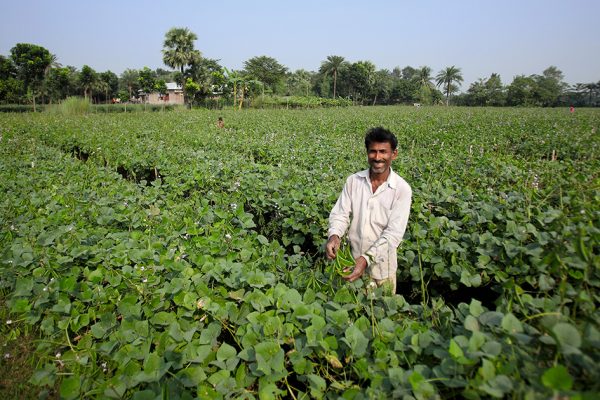Distributing relief in a pandemic: Lessons learned about digital cash transfers during COVID-19
Reading Time: 3 minutes
Almost 18 million people live in extreme poverty in Bangladesh. The impact of COVID-19 on their livelihoods has been catastrophic. Research by BIGD and PPRC shows a 73% drop in income in households living in extreme poverty when measured in the first week of April 2020 compared to two months prior. The biggest challenge during COVID-19 is how to get relief to these people, who often live in hard-to-reach areas.
BRAC is targeting households living in extreme poverty as a key group of recipients for emergency cash support. So far, the majority of cash transfers have been through door-to-door visits, but this is becoming increasingly challenging amidst lockdowns, and movement during COVID-19 presents a risk to staff and participants.
To overcome these challenges, BRAC has been piloting and scaling up the viability of digital cash transfers using bKash, BRAC Bank’s mobile money platform. bKash is the world’s largest provider of mobile financial services.
Here are eight key lessons from the pilot and scale-up phase, which was conducted with households selected through BRAC’s Ultra-Poor Graduation Programme.
- The majority of people living in ultra-poverty owned a mobile phone, but most were not registered with bKash: An initial rapid assessment conducted with 242 programme participants across four districts showed that 84% owned a mobile phone but only approximately 37% had a registered bKash account number. BRAC assisted 115 people to open a bKash account. 38 people were partnered with a trusted friend or family member who could receive the money through their account and give it to the person.
- Most people received the money successfully: 98% received the money successfully. Reasons for unsuccessful transfers included incorrect numbers, inactive accounts and submission of accounts registered on other mobile banking platforms (other than bKash). The last reason occured because, while participants recognise bKash as a mobile money service provider, bKash is also often used as the generic name for mobile money because of its mass penetration.
- A mobile wallet increased spending flexibility, making money last longer: A mobile wallet provided security to families living in ultra-poverty who do not have access to mainstream banking services. It was convenient for participants to withdraw money as they needed it, thereby reducing their chance of exhausting the total in a single transaction.
Read more: Clients narrate a powerful account of the impact of microfinance
- The majority of people were positive about digital transfers: Over 90% participants responded positively about cash transfer through mobile money. Only 7% thought that direct cash transfers were better, as they did not require mobile wallets or cash out fees.
- Digital transfers resulted in an improved understanding of technology and access to markets: The transfers improved women participants’ understanding of operating mobile phones and trust in mobile wallets, and increased the scope of their interaction with markets. It was noticed that, because mobile money agents often also run grocery shops, shopkeepers are now allowing people to purchase goods on credit. This is an important development since women living in ultra-poverty are often shunned and lack access to markets.
- People in remote areas are suffering from unavailability of agents: Nationwide lockdowns and strict social distancing measures have forced many mobile money agents to close their shops. As a result, participants in remote areas faced difficulty opening wallets and cashing out.
- Relief was received quickly: Digital cash transfers proved to be a quick process. On average, it took 3-4 days for a digital cash transfer, starting from phone number collection to resolving issues (if any) and final disbursement. It also reduces transportation costs.
Read more: Manoshi: Ensuring maternal care in a pandemic
- The success of transfers boosted employee morale: While the implementation of digital cash transfers for people living in ultra-poverty posed a lot of challenges among front-line staff, its success boosted their capacity and confidence in supporting participants with mobile money initiatives.
A total of 51,642 participants, including those in the pilot phase, have received the cash stipend of BDT 1,500 via bKash until 7 May 2020. BRAC is increasingly looking into opportunities to digitise services, particularly during COVID-19, to provide fast and effective support to people in the most need.
Rozina Haque is the programme head of BRAC’s ultra-poor graduation programme. Tahjib Shamsuddin is communications specialist of BRAC’s microfinance and ultra-poor graduation programme, and Sarah-Jane Saltmarsh is the head of programme and enterprise communications at BRAC.





